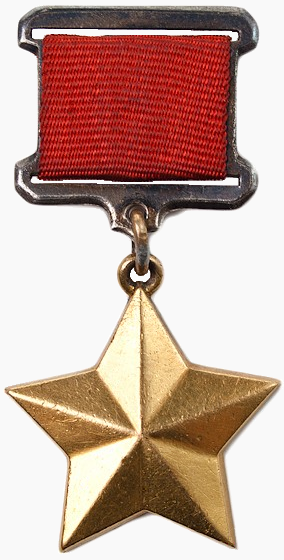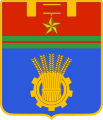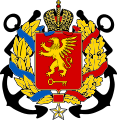
Hero of the Soviet Union
The title Hero of the Soviet Union (Russian: Герой Советского Союза, romanized: Geroy Sovietskogo Soyuza) was the highest distinction in the Soviet Union, awarded together with the Order of Lenin personally or collectively for heroic feats in service to the Soviet state and society.[1] The title was awarded both to civilian and military persons.
"Gold Star Medal" redirects here. For the Azerbaijani medal, see Gold Star Medal (Azerbaijan).Hero of the Soviet Union
Highest degree of distinction
Heroic feats in service to the Soviet state and society
Soviet and foreign citizens
No longer awarded
16 April 1934
20 April 1934
24 December 1991
12,777
A pension with survivor benefits in the event of the death of the title holder.
[8]
Priority on the with 50% rent reduction,[8] tax exempt and an additional 45 square metres (480 sq ft) in living space.
housing list
Annual round-trip first class airline ticket
[8]
Free local public transportation
[8]
Medical benefits
[8]
Entertainment benefits
[8]
Later recipients[edit]
The last recipient of the title "Hero of the Soviet Union" was a Soviet diver, Captain of the 3rd rank Leonid Mikhailovich Solodkov on 24 December 1991 for his leadership and participation in a series of unprecedented extreme depth diving experiments.[15] Following the collapse of the Soviet Union, this title was succeeded in Russia by the title "Hero of the Russian Federation", in Ukraine by "Hero of Ukraine" and in Belarus by "Hero of Belarus".[6] Azerbaijan's successor order is that of National Hero of Azerbaijan and Armenia's own hero medal is that of National Hero of Armenia, both modeled on the Soviet one.
Hero of Soviet Union obelisk of Saint Petersburg.
2009 Russian stamp commemorating the Hero of the Soviet Union award.
– future Chief Marshal of the Tank and Armored Troops, for actions near Stanislav
Hamazasp Babadzhanian
– last posthumous recipient to die in the line of duty.
Oleg Babak
– escaped from a forced-labor camp at Peenemünde with crucial intelligence on German rocket programs.
Mikhail Devyataev
– first human to fly in space.
Yuri Gagarin
– division commander in Afghanistan.
Pavel Grachev
– neutralized more than 50,000 explosive items during and after World War II.
Ivan Kharchenko
– First responding firefighter to the Chernobyl Disaster. Later died of radiation sickness.
Viktor Kibenok
– Youngest recipient (age 14). Posthumously awarded after being killed in combat during the Great Patriotic War
Valentin Kotyk
– the first woman awarded the title during World War II.
Zoya Kosmodemyanskaya
– participant in the Soviet partisan movement during World War II, commander of the Shchors partisan detachment.
Alexander Krivets
– oldest recipient; led a Nazi division to an ambush in Malkino.
Matvey Kuzmin
– intelligence officer responsible for the kidnappings and assassinations of several high-ranking Nazis.
Nikolai Kuznetsov
– World War II fighter pilot and the world's top female ace.
Lydia Litvyak
– the most successful Soviet submarine commander in terms of gross register tonnage (GRT) sunk.
Alexander Marinesko
– posthumously awarded for blocking an enemy machine-gun with his own body.
Alexander Matrosov
– Soviet pilot known for placing radiation sensors at the Chernobyl's Nuclear Power Plant, Reactor 4, during the 1986 explosion.
Nikolai Melnik
– sniper who led her brigade after suffering high casualties
Aliya Moldagulova
– Soviet Soldier and member of the Italian resistance.
Pore Mosulishvili
– Soviet general. Killed in action during the Battle of Moscow. The 8th Guards Rifle Division of the Red Army was named in his honor.
Ivan Panfilov
– highest scoring female sniper.
Lyudmila Pavlichenko
– Firefighter that responded to the Chernobyl Disaster, and later died of radiation sickness.
Vladimir Pravik
– Colonel General in World War II and the first commander of the 8th Tank Army.
Nikolay Pukhov
– Soviet World War II bomber pilot.
Endel Puusepp
– One of the top snipers of World War II, with over 500 kills.
Ivan Sidorenko
– Soviet spy, reported from Japanese information the exact date that Operation Barbarossa would begin.
Richard Sorge
– General Secretary of the Communist Party (1922–1953) and Head of Government as Prime Minister of the USSR (1941–1953).
Joseph Stalin
– Head of the fire department at the Chernobyl Nuclear Power Plant
Leonid Telyatnikov
– first woman to fly in space.
Valentina Tereshkova
– Soviet naval pilot during World War II.
Michael Tsiselsky
– Soviet sniper, killed 313 German soldiers.
Zhambyl Tulaev
– Marshal of the Soviet Union and Minister of Defense of the Soviet Union from 1976 until his death in 1984.
Dmitriy Ustinov
– sniper who killed 225 at the Battle of Stalingrad; his achievements are dramatized in the film Enemy at the Gates.
Vasily Zaytsev
Dmitry Komar, Vladimir Usov, and Ilya Krichevsky – Posthumously awarded for being killed while attempting to block from reaching the White House during the August Coup
IFVs
– Last recipient of the award before it was succeeded by the Hero of the Russian Federation award
Leonid Solodkov
Awards of the Soviet Union
Hero of Socialist Labor
Hero of the Russian Federation
Hero of Belarus
Hero of Ukraine
Hero of the Republic of Cuba
Hero of the People's Armed Forces
Order of Lenin
Alander, Jussi-Pekka (2012). Neuvostoliiton kunniamitalit (in Finnish). Tampere: Apali. 978-952-5877-13-7.
ISBN
(in Russian)
Website dedicated to Heroes of the Soviet Union and Russia
– an article on the title (in Russian)
Hero of the Soviet Union
of the Soviet Union in Volgograd – history and photos (in Russian)
Alley of Heroes
(in Russian)













